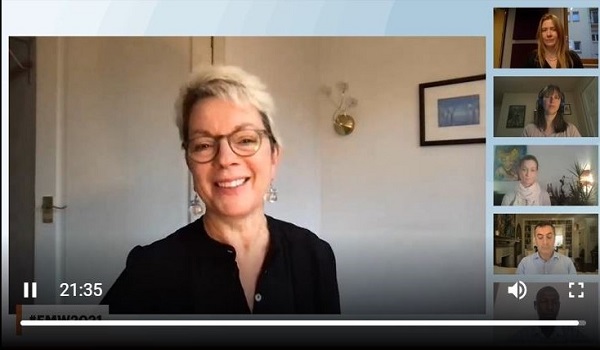 Closing plenary;
Credit: e-MFP
Closing plenary;
Credit: e-MFP
Over 500 participants took place in this year's online European Microfinance Week, organised by the Luxembourg-based European Microfinance Platform (e-MFP).
Held online for the second consecutive year, European Microfinance Week 2021 concluded Friday with a plenary entitled "Crisis and opportunity – where do we go from here?", in which a panel of senior speakers representing different stakeholder groups looked back over the period of the COVID-19 pandemic and discussed what changes will endure.
Moderated by Johanna Ryan, VisionFund International, and with Maria May from Gates Foundation, Jessica Schicks from BIO, Stanley Munyao from Musoni Microfinance, Babak Abbaszadeh from Toronto Centre, and Apricot Wilson from LMDF, this fast-moving and wide-ranging discussion covered questions from how resilient the sector has been, the catalysing effect it has had on digitalisation and the need to "not lose momentum, but strive for the best possible balance between personal contact and digital convenience and efficiency", according to one of the panellists.
This closing session was a suitable finish to a conference that wrestled with big questions across over 50 sessions. How can we better measure impact? How can the sector accelerate climate change adaptation measures? How can financial providers provide access to affordable and quality health care? And how can the sector understand and respond to structural barriers and norms to develop products and services that better serve the needs of women? These and many other topics were addressed in a variety of formats, from fireside-chats to panel discussions, interviews, plenaries and working sessions, involving over 500 participants and well over 100 speakers.
Each day kicked off with working sessions by e-MFP's Action Groups, all more active than ever before, having been involved in the organisation of fourteen sessions, including the opening plenary on climate finance after COP26 and a green finance Action Group session which was the most highly attended of the entire conference.
On Thursday, there was the hybrid ceremony for the €100,000 European Microfinance Award (EMA) on "Inclusive Finance & Health Care". This year's winner, presented by Her Royal Highness the Grand Duchess of Luxembourg, President of the European Microfinance Award's High Jury, was the Haitian non-profit Fonkoze Foundation for its "Boutik Santé" initiative, which trains and empowers community health entrepreneurs to provide screenings, education and health products to the poorest communities in Haiti.
Friday's plenary was followed by closing remarks by e-MFP Chairwoman Laura Hemrika. She began by recognising that European Microfinance Week 2021 coincides with the 15th anniversary of e-MFP, which has grown from 20 to over 130 members and which has a portfolio of initiatives and work streams more diverse and influential than ever before. Noting that there are both challenges and opportunities that come with an online conference, she said that while e-MFP hopes to be able to return to the in-person conference in 2022, it is clear that an online model invites and welcomes participants who would otherwise be unable to take part, and that a hybrid model going forward, involving stakeholders from all over the low-income world, will be inevitable.
Ms Hemrika then summarised some of the emerging themes of the conference as a whole and said that it is clear already that the move to more rigorous and accessible impact measurement, climate and green finance and financial inclusion for women (the topic of Wednesday's keynote and the just-announced topic of the EMA in 2022) are at the forefront of the sector's concerns today. She closed European Microfinance Week 2021 with an expression of thanks to all participants, speakers, event organisers and the e-MFP Secretariat for building successfully on 2020's experimental first online event and with the hope to see everyone in person for European Microfinance Week 2022.








